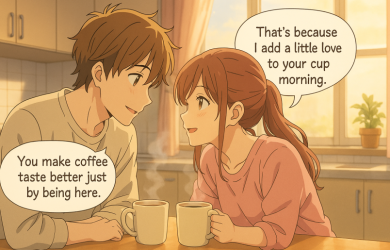Are You a Foster Boyfriend: How to Tell and What to Do About It

Unlock Daily 30-Sec Tips for a Happier Relationship
👉 Subscribe FREEKey Takeaways
Marriage.com AI Quick Summary
Ever poured your heart and soul into someone, only to feel like they’re just “not there yet”? Ever feel like you’re nurturing a relationship more than fostering a connection?
We’ve all been there. Maybe you’re showering them with love, putting their needs first, and yet… something feels off. Could you be a foster boyfriend?
This isn’t just about labels, it’s about understanding the dynamics at play. Are you giving freely while receiving hesitantly? Do their emotional walls feel a little too high? If you’re curious about where things stand, keep reading.
We’ll explore the signs, unpack the “why,” and, most importantly, guide you on how to foster a relationship that truly thrives.
What is a foster boyfriend?
If you have ever felt like you’re investing more in a relationship than you’re getting back, this could be a sign you’re in a “foster boyfriend” situation.
This term, recently coined in popular culture, describes a partner who emotionally “prepares” another for a future committed relationship with someone else. It’s essentially an unbalanced foster relationship, meaning that you provide love, support, and growth, but it may not be the intended “forever home.”
Understanding this concept can help you navigate confusing dynamics and make informed choices about your relationship’s future.
Are you a foster boyfriend: 6 ways to tell
Being a foster boyfriend doesn’t mean you’re literally raising someone else’s future partner, but rather that you’re unintentionally nurturing their emotional growth without receiving the same in return. Here are 6 signs to watch out for:
1. The effort feels unequal
You’re the one constantly initiating dates, making plans, and offering emotional support. You shower them with love and attention, but their contributions feel passive at best. Remember, healthy relationships are partnerships, not solo endeavors.
Dr. Jennifer Schulz, PhD in Psychology, states,
There may never be a 50/50 balance in relationships, but if the relationship feels mostly one-sided, with your efforts continuously going unreciprocated, chances are that you’re serving as a placeholder.
2. The future is a fuzzy cloud
When you bring up long-term commitments, conversations get awkward or they deflect with vague responses. They prioritize personal goals over “us” goals, leaving you wondering where you fit in their long-term picture.
3. “Not ready” becomes their mantra
They constantly cite personal issues or past experiences as reasons for not reciprocating your commitment. While everyone has baggage, excuses shouldn’t become a comfortable crutch. Actions, not justifications, speak volumes.
4. Physical affection is on autopilot
You initiate intimate moments, but their responses are lukewarm or infrequent. This lack of physical reciprocity often reflects an emotional distance as well. Remember, intimacy thrives on mutual desire and expression.
5. Your emotional tank is running empty
Constantly giving without receiving takes a toll. You might feel drained, unheard, and unappreciated. Your emotional needs deserve attention and fulfillment, too. Don’t neglect your own well-being.
6. Your loved ones raise an eyebrow
Close friends and family express concern about the imbalance in the relationship. They might see what you’re overlooking due to your emotional investment. Listen to their insights; they could hold valuable perspectives.
How to deal with being the foster boyfriend
A 2014 study published in the “Journal of Marriage and Family” found that people who perceive their partner as emotionally withdrawn reported lower levels of relationship satisfaction and higher levels of loneliness. This highlights how a lack of emotional reciprocity can contribute to feeling emotionally empty within a relationship.
Recognizing yourself as a “foster boyfriend” can be an eye-opening, albeit unsettling, experience. You may feel used, emotionally drained, and unsure of how to move forward. But don’t despair! Here are 11 steps to navigate this complicated situation and prioritize your own well-being:
1. Acknowledge the signs
Recognizing the patterns that label you as a “foster boyfriend” is the first step to change. Reflect on your experiences and see if they align with the signs discussed. Acceptance is key to addressing the issue and moving towards a healthier relationship dynamic.
2. Have an honest conversation
Communicate with your partner about how you feel neglected or undervalued, using specific instances to illustrate your point. This open dialogue is essential for understanding each other’s perspectives and determining if there’s a mutual desire to improve the relationship.
Dr. Schulz says,
Sometimes, relationship problems can just be a misunderstanding or a communication issue, so the first step is to communicate your concerns to your partner to see if there is a reasonable solution.
3. Listen to their response
Pay attention to how your partner reacts to your concerns. Are they defensive, or do they show a willingness to change? Their response is crucial for assessing their commitment to you and the relationship’s future.
4. Establish boundaries
Clearly define what behaviors you are and are not willing to tolerate. Setting boundaries is vital for maintaining your self-respect and ensuring your emotional needs are met. It’s okay to prioritize your well-being.
5. Seek support
Reach out to friends, family, or a professional for advice and emotional support. Discussing your situation with others can offer new insights and help you feel less isolated as you navigate these challenges.
6. Focus on yourself
Dedicate time to hobbies and activities that bring you joy and fulfillment. Self-care is crucial during this time, helping to boost your mental and emotional health as you deal with relationship uncertainties.
7. Consider different paths
Reflect on the state of your relationship and the feasibility of improvement. Whether it’s committing to work things out, taking a break, or parting ways, consider what’s best for your emotional well-being.
8. Don’t rush decisions
Allow yourself the time to fully process your feelings and the situation at hand. Rushing into a decision can lead to regret. Approach your choices with calm and consideration for your future happiness.
9. Prioritize your happiness
Your satisfaction and happiness are paramount. If the relationship constantly drains you, it may be time to reevaluate. Strive for a partnership that is fulfilling and supportive, where mutual growth is encouraged.
10. Learn from the experience
Use this situation as a learning opportunity. Reflect on what you’ve discovered about your needs and preferences in relationships. Apply these insights to future relationships to build more fulfilling connections.
11. Embrace moving forward
Whether you decide to stay or leave, focus on creating a positive future. This is a chance to ensure your emotional needs are prioritized and to cultivate relationships that bring happiness and growth.
FAQs
Maintaining a long-distance or foster relationship can be tough, but continuing connection doesn’t have to be long-range itself! Let’s dive into some FAQs about long-distance love and foster partnerships:
-
How to foster connection in a long-distance relationship
Video calls, virtual dates, and sharing daily details all help bridge the physical gap. Don’t forget handwritten letters, surprise care packages, and even online games for shared fun!
-
What fosters intimacy?
Intimacy thrives on emotional vulnerability and shared experiences. Talk about your day, your dreams, your fears. Plan virtual activities like cooking together or watching movies simultaneously. Quality time, even online, can strengthen intimacy.
What is the key ingredient to fostering intimacy that most of us miss? Author Heidi Priebe shares insight:
-
How do I handle disagreements in a foster relationship?
Take a deep breath and avoid impulsive communication. Schedule a calm video call to discuss clearly and actively listen to each other’s perspectives. Remember, you’re a team, even long-distance.
-
Is being a foster boyfriend emotionally draining?
It can be, especially if your needs aren’t reciprocated. Open communication and setting boundaries are crucial. If you feel constantly unfulfilled, prioritize your well-being and consider seeking support or exploring different paths.
-
What role does patience play in being a foster boyfriend?
Everyone grows at their own pace. Respect their journey while being honest about your own needs. If progress feels stagnant and your needs remain unmet, despite open communication and your best efforts, it might be time to re-evaluate the relationship’s trajectory. Remember, your happiness matters too.
Beyond the foster zone
Recognizing yourself as a “foster boyfriend” can be tough, but remember, it can also be the first step towards creating a relationship that nourishes both of you. The journey ahead won’t be easy, but honest communication, setting boundaries, and prioritizing your well-being are powerful tools.
Don’t hesitate to seek support – talk to trusted friends, family, or a therapist. Remember, you deserve a partner who values your efforts and invests equally in your emotional growth.
Take this experience as an opportunity to understand your needs and create a future where your happiness blooms. Step out of the “foster zone” and embrace a relationship that truly thrives.
Start today by initiating an open conversation. Your well-being and a fulfilling future await.
 Tips
Tips
Write your tip or submit a video tip
All tips are reviewed before the publishing.
Share this article on
Want to have a happier, healthier marriage?
If you feel disconnected or frustrated about the state of your marriage but want to avoid separation and/or divorce, the marriage.com course meant for married couples is an excellent resource to help you overcome the most challenging aspects of being married.
Recent Articles
Related Quizzes
Unlock Daily 30-Sec Tips for a Happier, Healthier Relationship
👉 Subscribe FREE on YouTube We'd love your feedback!
We'd love your feedback!
 Expert Q&A
Expert Q&A
Ask your question related to this topic & get the support you deserve from experts.



















 Thanks for your feedback!
Thanks for your feedback!